

Resource library Information - Adult Protection. Surviving your social work degree placement. Current and former students provide some tips on how to avoid potential pitfalls and get the most out of your placement (more details on CareSpace) ‘I made an effort to get involved and everything clicked’ I have just finished my level 2 placement of 100 days in a relatively big statutory team.
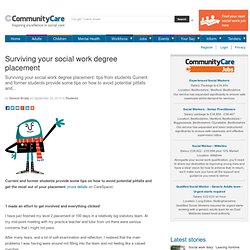
At my mid-point meeting with my practice teacher and tutor from uni there were serious concerns that I might not pass. After many tears, and a lot of self-examination and reflection, I realised that the main problems I was having were around not fitting into the team and not feeling like a valued member. After this point (and it took some hard work on my part) I felt like something clicked. I cannot fault the excellent supervision I was given, both formal (1.5 hours per week) and informal peer support from other members of the team.
CareSpace user student1986 ‘Just try to enjoy it’ I am just finishing the end of my first year on the BA and also my 80-day placement. Getting the best from social work degree placements. By Dr Barry Cooper, lecturer in social work, Open University.
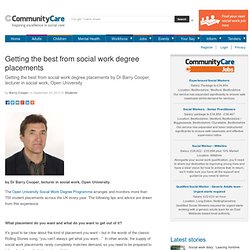
Why social work degree placements are important. Placements are central to the social work student experience but the system could soon change, writes Corinne May-Chahal, co-chair of the College of Social Work.

Why do we have placements on social work degrees? Placements create opportunities for learning and practising social work knowledge and skills, ensuring that students meet the standards for professional conduct in practice. It is not possible for students to become practitioners through writing and college based assessments alone. Practice requires complex skills, involving assessment, analysis, decision making and professional judgement. Practice_learning130710.pdf.
Ten things you can do to make your social work practice placement a success. Dealing with problems on social work student placements. By Dr Barry Cooper, lecturer in social work, Open University.
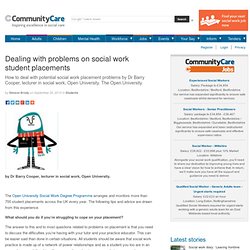
The Open University Social Work Degree Programme arranges and monitors more than 700 student placements across the UK every year. The following tips and advice are drawn from this experience. What should you do if you’re struggling to cope on your placement? The answer to this and to most questions related to problems on placement is that you need to discuss the difficulties you’re having with your tutor and your practice educator. This can be easier said than done in certain situations. Having feelings of “not coping” can feel, well, pretty disastrous. Information literacy An online learning resource from IRISS. Confidence through evidence toolkit Making better use of evidence in social services.
LEAP framework Learning, evaluation and planning. The Assessment Triangle. The Assessment Triangle is a key concept within child welfare and is a term that has been used since the late 1990s.

In Scotland, it has been adopted within the development of an Integrated Assessment Framework, to which we also refer in this learning resource. There are a number of aspects of child assessment, in any domain – the home, the playground, the classroom, the GP surgery, or residential care, and others – where you will be thinking about assessment models and practice. This learning resource is intended to introduce you to the Triangle so that it may help you order your impressions (or assessment) of both a child's needs and her aspirations. This learning resource consists of five sections: Assessment, Key Concepts, The Triangle, and Mairi's Life. Includes an interview with Professor Norma Baldwin who chaired the National Working Group to look at an integrated assessment framework. Human Rights & the UK Human Rights Act. Reflective practice.
Key Capabilities in Child Care Protection website. Communication and practice learning Exploring the themes of verbal, non-verbal and written communication. Harry Stevenson: Take pride in social work. AT times newspapers and magazines look for different people to talk about their work, a sort of “a day in the life of…” type feature.

But, a day in the life of a social worker? I don’t know where you would begin. I can tell you about a day. I can tell you about another day. I could even tell you about a third day. I am often asked “what do social workers do?” Social workers are people dealing with people. Yet, there is one thing that social workers do every day. Deciding to remove someone’s liberty because they are mentally ill and may cause themselves or someone else harm is not a decision anyone can take lightly.
Arriving at the right package of support for an adult with learning disabilities which reflects their own views and gives them the support they need and the freedom they want, is a tricky thing to get right – particularly when their nearest relatives do not agree. Social workers have plenty of reasons to be cheerful. As Ian Dury and the Blockheads sang, there are still reasons to be cheerful – in this case about social work.
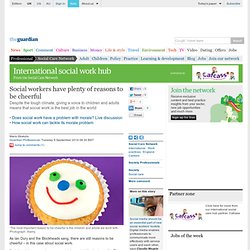
Social work has never been an easy job; we do it for the love of it. This devotion to the cause does not mean, however, that we should expect or tolerate inadequate working conditions. In a difficult climate, good managers are vital for morale. The best staff motivator is leading by example, and directors need to be able to explain their vision for the service while remaining open to challenges.
When tough decisions need to be made, the best directors explain their rationale and bring staff along with them. I once saw him straightening one excited little lad’s tie for him before a presentation ceremony; those are the sort of moments that make the job worthwhile. How social work can tackle its morale problem. A few years ago, an academic in another field was telling me about how depressed he was about what was happening in his university and that he was likely to become unemployed.
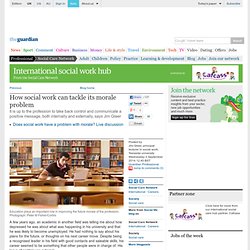
He had nothing to say about his plans for the future, or thoughts on his next career move. Despite being a recognised leader in his field with good contacts and saleable skills, his career seemed to be something that other people were in charge of. His locus of control was external. Home page. Learning%20log. Publication: Resources for Reflective Learning. Learning Object: Reflective Practice.